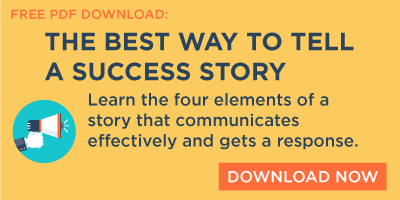
Almost everywhere I go I hear managers and salespeople say, “Yeah, case studies are very valuable. We need to get more case studies.” So why don’t more sales operations have more case studies? What’s holding them back? I can tell you what prevents most sales teams from having enough case studies:
- Case studies require some level of client participation. While your client may indeed be pleased with what you have done, they are busy, and taking time out their busy day to write or even provide information to someone in your organization is not an “A” priority for them.
- Your sales team probably doesn’t know who to nominate. Too often we are focused on making the next sale and not focused on what we did well in the last sale.
- While most people agree taking time to gather information for case studies is important, it’s not urgent. So it never gets done.
So, how do you address these problems? Here are some ideas:
1. Focus on successes more often.
I am going to make an assumption that if your clients are spending money on your products and services regularly, they are doing it for a reason – one that is related to a return on their investment. No one writes checks frivolously these days. So get your salespeople thinking about and talking about successes you have produced for your customers regularly. When I was a sales manager we set aside ten minutes in each sales meeting to talk about successes we had produced for our clients in the past week. Not everyone had one each week, but a few people did. And over time, the momentum built up. We documented every one of those successes with a few simple notes every week. Having a paradigm about producing results is good for many reasons, not the least of which is getting a renewal, but it’s really strong for securing new appointments.
2. Make the process less formal.
You don’t have to schedule an elongated process with the corporate marketing team to become aware of a client success. Neither do you have to produce a four-page, graphically rich document. Salespeople should be talking about ROI with clients all the time anyway, and they will naturally uncover examples that can be shared. When a client says, “Mary, that last program we put in place was the best we’ve ever done. The idea was brilliant, and your team’s execution was strong. We got more new customers in that period than any other.” Too many salespeople just say, “Thank you,” and let that opportunity fly by. What they should say is, “Bill, I appreciate that feedback. Would you mind if I shared that quote with prospects that don’t know us as well as you do?” Most clients will say yes. Now, you have a quote to use in an email or letter that can be attributed.
3. Use all the media available.
We all have a device in our pocket or purse that has a camera, shoots HD video, and has voice memo for recording conversation. How tough can it be to document what somebody says, or shoot informal video that shows your product in action, or pictures of the outcome? Just try it a few times!
4. Shine the light on how you worked with the client.
What problems did you solve? How did you make someone’s business life better or more efficient?What are they saying to you? Be a sponge, and remember those things – and share them when you talk to prospects about how you and your company work with clients. That’s what people really want to know.
5. Measure your success documenting success.
Measurement improves performance. Start talking about successes in every meeting. Ask people to share stories and quotes about how they help their clients achieve goals and solved problems. Then measure the growth of your success library (both formal and informal) to see your progress. I bet you could have a substantial improvement in documenting success stories in only 90 days if you did these things, and kept on doing them.
Getting a case study should not be a difficult as doing your taxes. Lower the barriers, focus on success, and document the stories in many forms and many media. Soon, it will be apparent to prospects and customers alike why they should be talking to you all the time.


